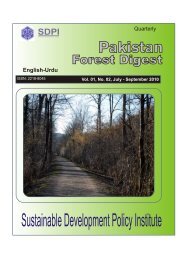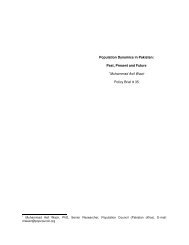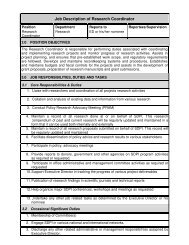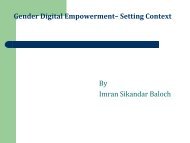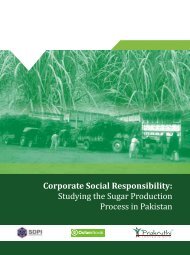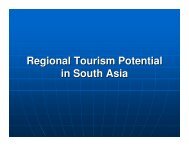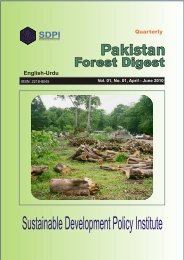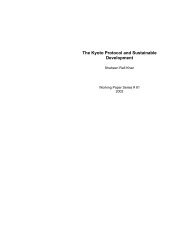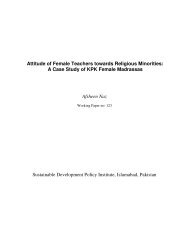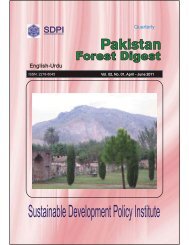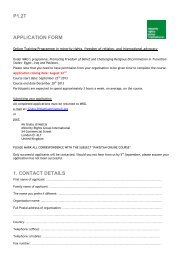Annual Report 2009-10 - Sustainable Development Policy Institute
Annual Report 2009-10 - Sustainable Development Policy Institute
Annual Report 2009-10 - Sustainable Development Policy Institute
- No tags were found...
You also want an ePaper? Increase the reach of your titles
YUMPU automatically turns print PDFs into web optimized ePapers that Google loves.
<strong>Annual</strong> <strong>Report</strong><strong>2009</strong> - 20<strong>10</strong>Liberalising Health Services under the Proposed SAARC Framework Agreement on Tradein Services (SAFAS): Implications for South Asian CountriesThis study has been commissioned by the Center of <strong>Policy</strong> Dialogue In partnership with the<strong>Sustainable</strong> <strong>Development</strong> <strong>Policy</strong> <strong>Institute</strong> (SDPI). SDPI will be focusing on the country perspectiveof trade in health services and its potential within the framework of SAFAS .The countriesfrom South Asia region taken to explore where potential will be explored includes Bangladesh,India, Sri Lanka and Pakistan.South Asian countries are already engaged in trade in health services within the region andhave further potential for expansion of health services. Before taking steps to liberalise the servicessector there is a need to identify the current state of potentials, weaknesses and constraints.A formal mechanism of integration of health services in the region within the SAFASand GATS can be useful for countries of the region. The scope of the study is limited to exploringthe possibilities of liberalizing the health sector under SAFAS which is WTO-GATS compatibleand assesses associated risks of opening the domestic health service sector of the SouthAsian countries to the foreign providers of the health service. In terms of analytical approach thestudy will perform a Value Chain Analysis of the health sector in order to capture the wholerange of activities in the health services sector that provides the final service to the patients.Through the value chain approach the major constraints and opportunities faced by the sectorcan be identified. The value chain framework will help to identify and analyze all the participantsin the value chain and the dynamics of the relationships among them, which will in turn can beused as inputs for improvement of the health services in the region in terms of efficiency of servicesand benefits. The value chain analysis will also examine other factors influencing the performanceof the sector, including the legal, regulatory and policy environment.For further details contact Ms. Afshan Ahmed. Afshan@sdpi.orgUtilizing Foreign Assistance and Domestic Resources to Sustain <strong>Development</strong>InitiativesExploring the Potential of Local Resource Mobilization in ChakwalMost of the Civil Society Organizations (CSOs) in Pakistan are heavily dependent on foreignfunding and little effort is taken by these organizations to tap the hidden domestic resourcesavailable in the country. Limited foreign funding and heavy dependence on it leads to the needfor domestic resource mobilization. Evidence has shown that domestic funding sources cane betapped into by local organizations for their programmes. Resources are provided in the shape ofZakat (obligation) and Saddaqat (provisional) to trusts, foundations and CSOs. This immensepotential exists in the country, which may be explored by local organizations for funding their resources.SDPI was supported by PLAN International to provide baseline information on the available resourcesin the district Chakwal, to find out the potential for local resource mobilization.The SDPI team collected more than ten case studies from potential sources and found that thecorporate sector, the business community, individual philanthropists and trusts have potentialwhich may be tapped into by local organizations. Networking is a key to success which requiresimmediate attention of all the stakeholders. There is a need to develop a network of Civil SocietyOrganizations (CSOs) in the district, which would ensure participation of the all the national andlocal level organizations. It would also serve as a platform for raising collective voices and sharingknowledge. It will also help the CSOs and Plan Pakistan to focus on these areas for futurelocal level interventions in the district.During the visits and discussion sessions with different stakeholders, it was revealed that an advocacycampaign must be initiated in the district to create pressure groups in the district to influencekey policy makers at the local and provincial level. In a consultative meeting with Plan part-36S u s t a I n a b l e D e v e l o p m e n t P o l I c y I n s t I t u t e



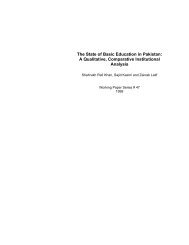
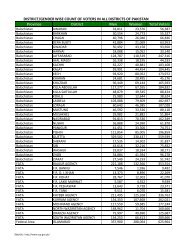
![(October - December, 2010) [13th SDC Special Bulletin]](https://img.yumpu.com/50118608/1/184x260/october-december-2010-13th-sdc-special-bulletin.jpg?quality=85)
